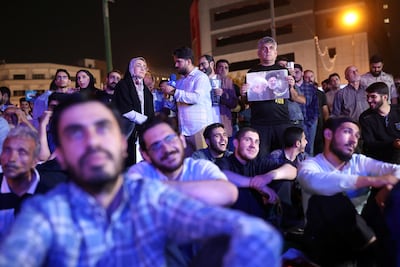Iran’s top two presidential candidates accused each other of having no solution to the country’s problems ahead of Friday's runoff election aimed at choosing a successor for the late president Ebrahim Raisi, who died last month in a helicopter crash.
During a more than two-hour televised debate, reformist candidate Masoud Pezeshkian attacked his competitor, Saeed Jalili, a hard-line former nuclear negotiator, for his lack of experience, saying: “Tell me, what single company have you ever managed to make you capable of running the country?”
Mr Jalili defended himself by highlighting his career and several positions held, including that of a top nuclear negotiator.
Mr Pezeshkian further questioned his opponent on what plans he would have for reaching a nuclear deal, with Mr Jalili responding he would approach it “based on strength not weakness”, without providing details.
Iran will hold a runoff presidential election on Friday, only its second since the 1979 Islamic Revolution, after only 39.9 per cent of its voting public cast a ballot the previous week. Of over 24.5 million votes, more than 1 million ballots were later rejected – typically a sign of people feeling obligated to head to the polls but wanting to reject all the candidates.
Mr Pezeshkian, Iran's sole reformist candidate, said he would focus his foreign policy on building more ties with other countries instead of the aggressions seen by previous governments.
“If we want to grow in the world, the more connections we make, the better we can live,” he said. “The skill of the Ministry of Foreign Affairs or foreign policy should have flexibility and various alternatives for negotiations and trade,” he added.
The ultraconservative Mr Jalili, for his part, said that the discussion of foreign policy is an extension of an internal one.
“You must definitely have a dynamic, active, and successful foreign policy. If we want to gain benefits from those with whom we have most differences, it will certainly not be achieved,” he said.
Mr Pezeshkian also defended former president Hassan Rouhani's foreign policy in signing the nuclear deal known as the Joint Comprehensive Plan of Action (JCPOA) and called for intensified efforts to approve the FATF-related bills by relevant Iranian bodies to expand trade relations with the world. Mr Rouhani endorsed Mr Pezeshkian in this election.
Both sides also promised to address the problems of the country's poor, workers, women, ethnic groups and religious minorities and vowed to provide better and faster internet – a plea to a younger generation that showed apathy during Friday's vote.
Both candidates also said the low turnout in the first round – the lowest-ever poll turnout in the Islamic Republic’s history – should be probed.
“It is not acceptable that some 60 per cent (of voters) did not cast a ballot,” said Mr Pezeshkian.
The US said on Monday it expected no “fundamental change” from Iran no matter who wins the presidential election runoff and said it did not consider the first round free and fair.
The candidates will have their second and final debate later on Tuesday.
The Great Derangement: Climate Change and the Unthinkable
Amitav Ghosh, University of Chicago Press
Indian construction workers stranded in Ajman with unpaid dues
How to watch Ireland v Pakistan in UAE
When: The one-off Test starts on Friday, May 11
What time: Each day’s play is scheduled to start at 2pm UAE time.
TV: The match will be broadcast on OSN Sports Cricket HD. Subscribers to the channel can also stream the action live on OSN Play.
Where to submit a sample
Volunteers of all ages can submit DNA samples at centres across Abu Dhabi, including: Abu Dhabi National Exhibition Centre (Adnec), Biogenix Labs in Masdar City, NMC Royal Hospital in Khalifa City, NMC Royal Medical Centre, Abu Dhabi, NMC Royal Women's Hospital, Bareen International Hospital, Al Towayya in Al Ain, NMC Specialty Hospital, Al Ain
Anna and the Apocalypse
Director: John McPhail
Starring: Ella Hunt, Malcolm Cumming, Mark Benton
Three stars
ABU%20DHABI'S%20KEY%20TOURISM%20GOALS%3A%20BY%20THE%20NUMBERS
%3Cp%3EBy%202030%2C%20Abu%20Dhabi%20aims%20to%20achieve%3A%3C%2Fp%3E%0A%3Cp%3E%3Cstrong%3E%E2%80%A2%2039.3%20million%20visitors%2C%3C%2Fstrong%3E%20nearly%2064%25%20up%20from%202023%3C%2Fp%3E%0A%3Cp%3E%3Cstrong%3E%E2%80%A2%20Dh90%20billion%20contribution%20to%20GDP%2C%3C%2Fstrong%3E%20about%2084%25%20more%20than%20Dh49%20billion%20in%202023%3C%2Fp%3E%0A%3Cp%3E%3Cstrong%3E%E2%80%A2%20178%2C000%20new%20jobs%2C%3C%2Fstrong%3E%20bringing%20the%20total%20to%20about%20366%2C000%3C%2Fp%3E%0A%3Cp%3E%3Cstrong%3E%E2%80%A2%2052%2C000%20hotel%20rooms%2C%3C%2Fstrong%3E%20up%2053%25%20from%2034%2C000%20in%202023%3C%2Fp%3E%0A%3Cp%3E%3Cstrong%3E%E2%80%A2%207.2%20million%20international%20visitors%2C%3C%2Fstrong%3E%20almost%2090%25%20higher%20compared%20to%202023's%203.8%20million%3C%2Fp%3E%0A%3Cp%3E%3Cstrong%3E%E2%80%A2%203.9%20international%20overnight%20hotel%20stays%2C%3C%2Fstrong%3E%2022%25%20more%20from%203.2%20nights%20in%202023%3C%2Fp%3E%0A
Russia's Muslim Heartlands
Dominic Rubin, Oxford
Conflict, drought, famine
Estimates of the number of deaths caused by the famine range from 400,000 to 1 million, according to a document prepared for the UK House of Lords in 2024.
It has been claimed that the policies of the Ethiopian government, which took control after deposing Emperor Haile Selassie in a military-led revolution in 1974, contributed to the scale of the famine.
Dr Miriam Bradley, senior lecturer in humanitarian studies at the University of Manchester, has argued that, by the early 1980s, “several government policies combined to cause, rather than prevent, a famine which lasted from 1983 to 1985. Mengistu’s government imposed Stalinist-model agricultural policies involving forced collectivisation and villagisation [relocation of communities into planned villages].
The West became aware of the catastrophe through a series of BBC News reports by journalist Michael Buerk in October 1984 describing a “biblical famine” and containing graphic images of thousands of people, including children, facing starvation.
Band Aid
Bob Geldof, singer with the Irish rock group The Boomtown Rats, formed Band Aid in response to the horrific images shown in the news broadcasts.
With Midge Ure of the band Ultravox, he wrote the hit charity single Do They Know it’s Christmas in December 1984, featuring a string of high-profile musicians.
Following the single’s success, the idea to stage a rock concert evolved.
Live Aid was a series of simultaneous concerts that took place at Wembley Stadium in London, John F Kennedy Stadium in Philadelphia, the US, and at various other venues across the world.
The combined event was broadcast to an estimated worldwide audience of 1.5 billion.
Liz%20Truss
%3Cp%3EMinisterial%20experience%3A%20Current%20Foreign%20Secretary.%0D%3Cbr%3E%0DWhat%20did%20she%20do%20before%20politics%3F%20Worked%20as%20an%20economist%20for%20Shell%20and%20Cable%20and%20Wireless%20and%20was%20then%20a%20deputy%20director%20for%20right-of-centre%20think%20tank%20Reform.%0D%3Cbr%3E%0DWhat%20does%20she%20say%20on%20tax%3F%20She%20has%20pledged%20to%20%22start%20cutting%20taxes%20from%20day%20one%22%2C%20reversing%20April's%20rise%20in%20National%20Insurance%20and%20promising%20to%20keep%20%22corporation%20tax%20competitive%22.%3C%2Fp%3E%0A
THE SPECS
Engine: 1.5-litre, four-cylinder turbo
Transmission: seven-speed dual clutch automatic
Power: 169bhp
Torque: 250Nm
Price: Dh54,500
On sale: now
Score
Third Test, Day 1
New Zealand 229-7 (90 ov)
Pakistan
New Zealand won the toss and elected to bat
THE%20SPECS
%3Cp%3EEngine%3A%203-litre%20V6%20turbo%20(standard%20model%2C%20E-hybrid)%3B%204-litre%20V8%20biturbo%20(S)%0D%3Cbr%3EPower%3A%20350hp%20(standard)%3B%20463hp%20(E-hybrid)%3B%20467hp%20(S)%0D%3Cbr%3ETorque%3A%20500Nm%20(standard)%3B%20650Nm%20(E-hybrid)%3B%20600Nm%20(S)%0D%0D%3Cbr%3EPrice%3A%20From%20Dh368%2C500%0D%3Cbr%3EOn%20sale%3A%20Now%3C%2Fp%3E%0A


